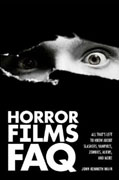Horror Films FAQ
John Kenneth Muir
book reviews:
· general fiction
· chick lit/romance
· sci-fi/fantasy
· graphic novels
· nonfiction
· audio books
· author interviews
· children's books @
curledupkids.com
· DVD reviews @
curledupdvd.com
newsletter
win books
buy online
links
home
for authors
& publishers
for reviewers

 |
Horror Films FAQ: All That's Left to Know About Slashers, Vampires, Zombies, Aliens, and More (Faq Series) John Kenneth Muir Applause Books Paperback 386 pages October 2013 |
|
The only thing scarier than a well-made horror film may be a poorly made horror film. The genre is certainly filled with both styles, and any analysis of horror films should consider this fact when studying the contribution that horror makes to film history. While these films are dismissed often as cheap entertainment, popular fodder for the movie-going masses, John Kenneth Muir attempts to rectify such charges. In Horror Films FAQ
These initial openings are followed by chapters that classify horror films into several different subcategories based on type and arranged chronologically. Several of the categories may seem obvious--“Vampire Films,” “Ghost Films,” “Zombie Films,” “Alien Films,” and several other common horror movie styles headline the chapters with catchy quotes and slogans. However, some less-obvious categories include “Rape and Revenge Films,” “Evil Children Films,” and “Found-Footage Horror Films.” These other chapters present categories less known so that no type of scary movie is excluded. Stephen King adaptations get their own chapter, and there is even a chapter dedicated to “horror-comedy films,”—which, as Muir immediately points out, is different than “comedy-horror films.” Each chapter, in keeping with the theme, presents films from different years to show that these movies transcend time and thus are more than just popular, flavor-of-the-month movies. Instead, these films are significant contributors to the genre, which strengthens the genre’s general contribution to film. Several famous names discussed are familiar to horror fans. In the director’s chair, John Carpenter, Wes Craven, George R. Romero, and countless others are all studied. Monsters and villains of every type make an appearance, and so does a discussion of the many actors who play them. No matter who is discussed, readers gain insight into all of these people, both real and fictional, and this better understanding leads to a deeper appreciation of the films. The exclusion of particular films may anger some readers, as Muir is forced to pick and choose what he discusses. Throughout the book, countless movies are referenced only in passing, and this is frustrating at times because sometimes whole decades are skipped so that a certain movie is discussed extensively. Such an arrangement is hardly fair to the people involved in the neglected films or the fans of those movies; however, it is only natural that the book is not comprehensive, as some movies are not as good or important as others. Extending the chapters would make the book, already 370 pages, much longer and force higher publishing costs for a text that might suddenly lose its appeal and readership because it would seem intimidating. Readers must understand this and forgive Muir for it. A fault that is less forgivable is the way that Muir occasionally emphasizes his political views in the book, especially when describing horror films that take place in the 1980s. Suddenly, it seems that all artistic endeavors during that decade were designed as criticism of the Regan administration, which suffers harshly in Muir’s interpretation. Such a comment is not to suggest that Muir is mistaken, because his analysis of these films (and all films he discusses) is quite thorough. Muir is almost certainly correct in his assertions that the horror films of the 1980s comment on the rampant conservatism of the time; however, his over-emphasis of such an idea forces the consideration that he takes an opportunity to push a political agenda, which is damaging to his credibility at worst and tiresome at best. Motivation often involves a certain amount of speculation; therefore, such a flaw is relegated to less import than it would be if known with certainty. What is certain, though, is that Muir succeeds in almost every aspect of his writing, from captivating readers with interesting facts and unique perspectives, to providing relevance and appreciation to an enormous part of film history and culture that is often overlooked or mocked. Horror Films FAQ Originally published on Curled Up With A Good Book at www.curledup.com. © Joshua Myers, 2014 |
|
|
|
 Click here to learn more about this month's sponsor! |
|
| fiction · sf/f · comic books · nonfiction · audio newsletter · free book contest · buy books online review index · links · · authors & publishers reviewers |
|
| site by ELBO Computing Resources, Inc. | |
 The facts in
The facts in